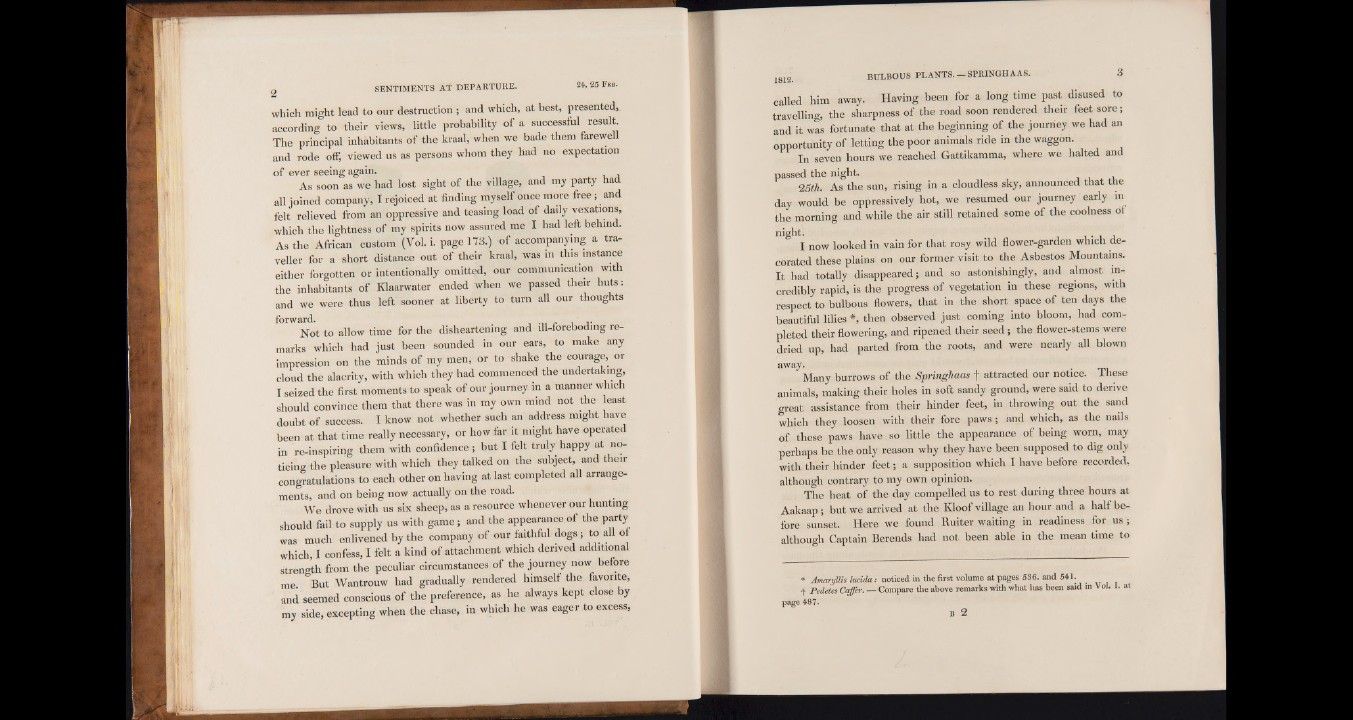
2 SENTIMENTS AT DEPARTURE. 24-, 25 Feb.
which might lead to our destruction ; and which, at best, presented,,
according to their views, little probability of a successful result
The principal inhabitants of the kraal, when we bade them farewell
and rode off, viewed us as persons whom they had no expectation
of ever seeing again.
As soon as we had lost sight of the village, and my party had
all joined company, I rejoiced at finding myself once more free; and
felt relieved from an oppressive and teasing load of dady vexations,
which the lightness of my spirits now assured me I had left behind.
As the African custom (Vol. i. page 173.) of accompanying a traveller
for a short distance out of their kraal, was in this instance
either forgotten or intentionally omitted, our communication with
the inhabitants of Klaarwater ended when we passed their huts:
and we were thus left sooner at liberty to turn all our thoughts
Not to allow time for the disheartening and ill-foreboding remarks
which had just been sounded in our ears, to make any
impression on the minds of my men, or to shake the courage, or
cloud the alacrity, with which they had commenced the undertaking,
I seized the first moments to speak of our journey m a manner which
should convince them that there was in my own mind not the least
doubt of success. I know not whether such an address might have
been at that time really necessary, or how far it might have operated
in re-inspiring them with confidence ; but I felt truly happy at noticing
the pleasure with which they talked on the subject, and their
congratulations to each other on having at last completed all arrangements,
and on being now actually on the road.
We drove with us six sheep, as a resource whenever our hunting
should fail to supply us with game; and the appearance of the party
was much enlivened by the company of our faithful dogs ; to all of
which, I confess, I felt a kind of attachment which derived additional
strength from the peculiar circumstances of the journey now before
me But Wantrouw had gradually rendered himself the favorite,
and seemed conscious of the preference, as he always kept close by
my side, excepting when the chase, in which he was eager to excess,
1812. BULBOUS PLANTS. — SPRINGHAAS. 3
called him away. Having been for a long time past disused to
travelling, the sharpness of the road soon rendered their feet sore;
and it was fortunate that at the beginning of the journey we had an
opportunity of letting the poor animals ride in the waggon.
In seven hours we reached Gattikamma, where we halted and
passe2d5 tthh.e Anisg htht.e sun, rising in a cloudless sky, announced that the
day would be oppressively hot, we resumed our journey early in
the morning and while the air still retained some of the coolness of
night.I
now looked in vain for that rosy wild flower-garden which decorated
these plains on our former visit to the Asbestos Mountains.
It had totally disappeared; and so astonishingly, and almost incredibly
rapid, is the progress of vegetation in these regions, with
respect to bulbous flowers, that in the short space of ten days the
beautiful lilies *, then observed just coming into bloom, had completed
their flowering, and ripened their seed ; the flower-stems were
dried up, had parted from the roots, and were nearly all blown
away.M any burrows of the Springhaas f attracted our noti.ce. These
animals, making their holes in soft sandy ground, were said to derive
great assistance from their hinder feet, in throwing out the sand
which they loosen with their fore paws; and which, as the nails
of these paws have so little the appearance of being worn, may
perhaps be the only reason why they have been supposed to dig only
with their hinder feet; a supposition which I have before recorded,
although contrary to my own opinion.
The heat of the day compelled us to rest during three hours at
Aakaap ; but we arrived at the Kloof village an hour and a half before
sunset. Here we found Ruiter waiting in readiness for us ;
although Captain Berends had not been able in the mean time to
* Amaryllis lu c id a noticed in the first volume at pages 536. and 541.
t Pcdctes Coffer. — Compare the above remarks with what has been said in Vol. I. at
page 4-87.
B 2